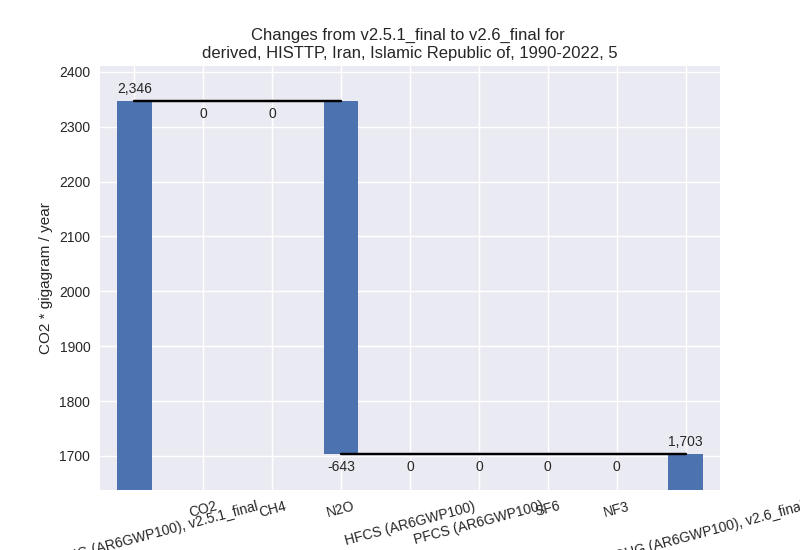Changes in PRIMAP-hist v2.6_final compared to v2.5.1_final for Iran, Islamic Republic of
2024-09-24
Johannes Gütschow
Change analysis for Iran, Islamic Republic of for PRIMAP-hist v2.6_final compared to v2.5.1_final
Overview over emissions by sector and gas
The following figures show the aggregate national total emissions excluding LULUCF AR6GWP100 for the country reported priority scenario. The dotted linesshow the v2.5.1_final data.
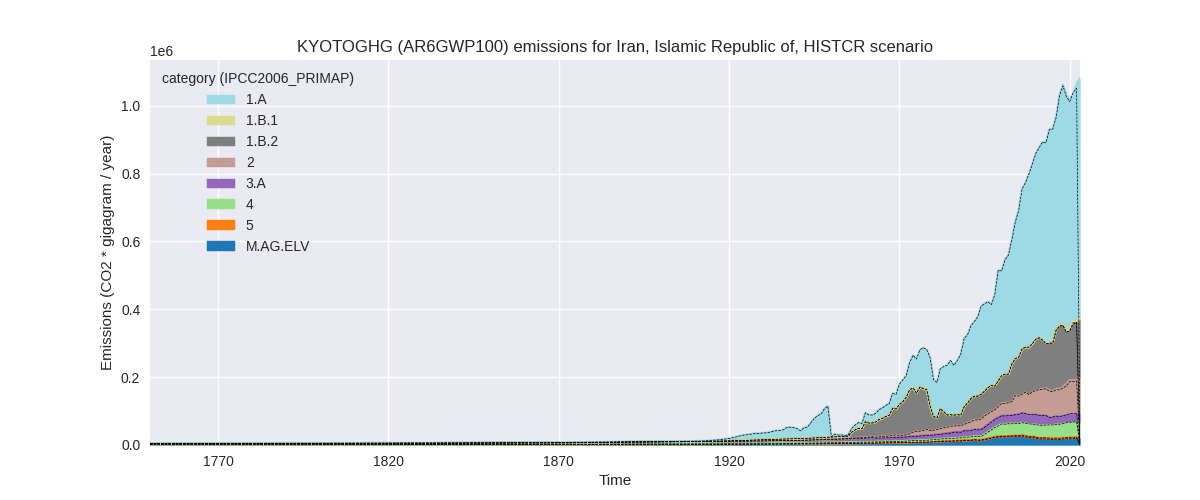
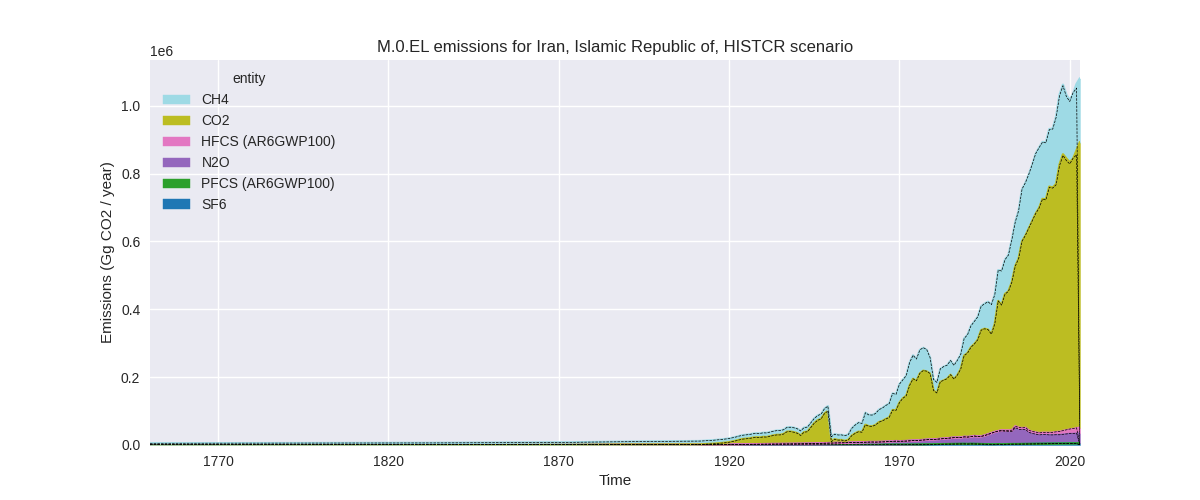
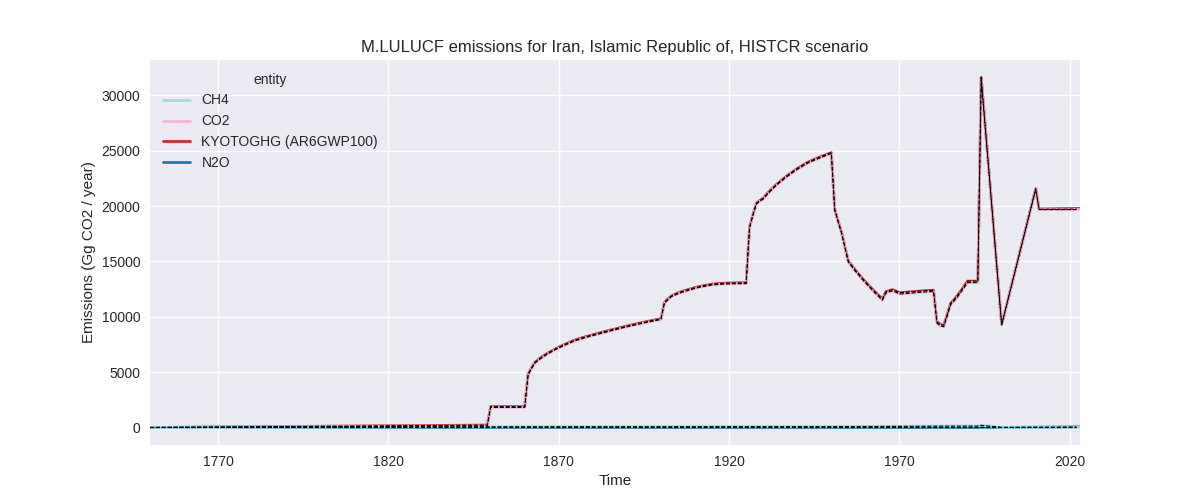
The following figures show the aggregate national total emissions excluding LULUCF AR6GWP100 for the third party priority scenario. The dotted linesshow the v2.5.1_final data.
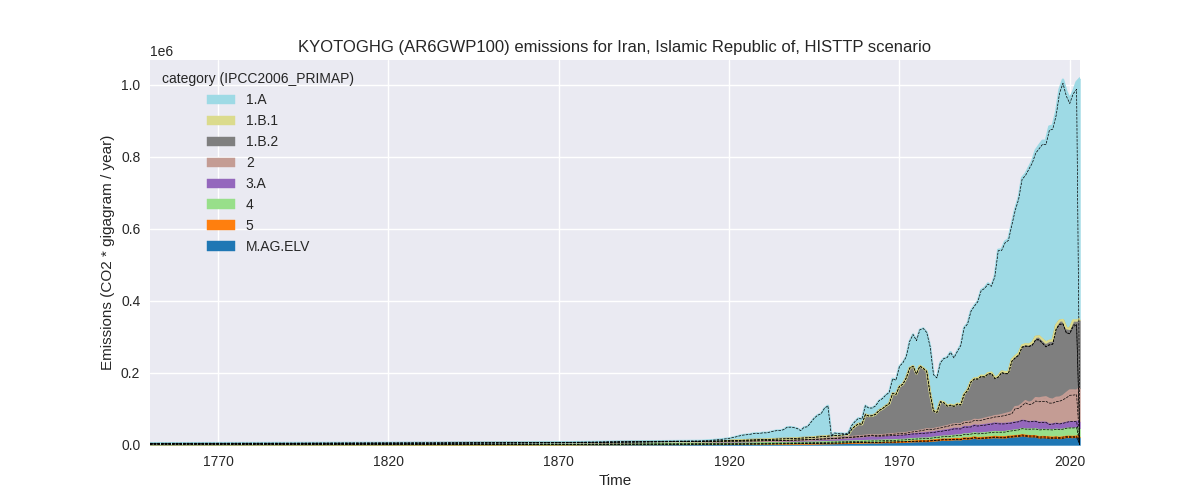
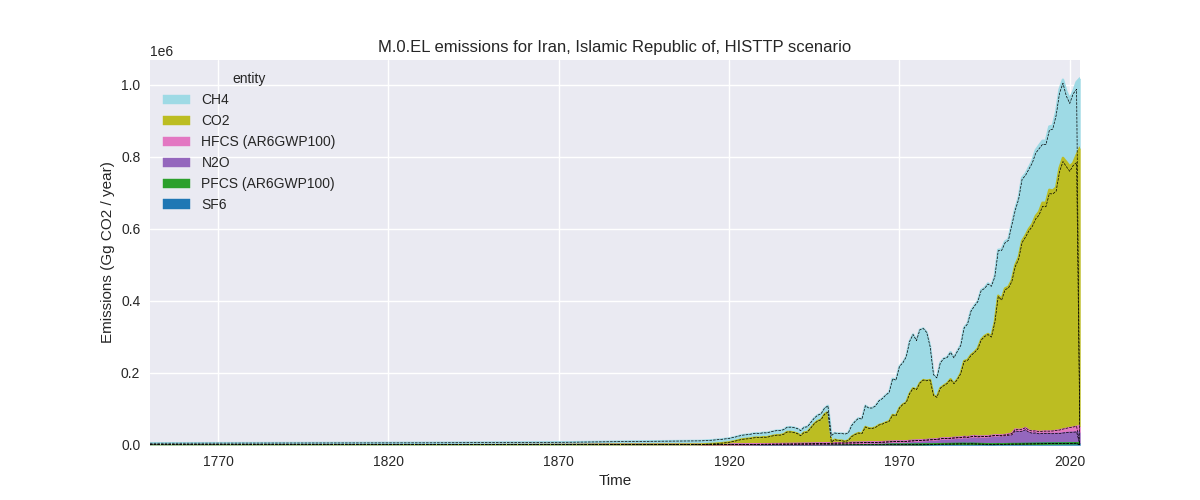
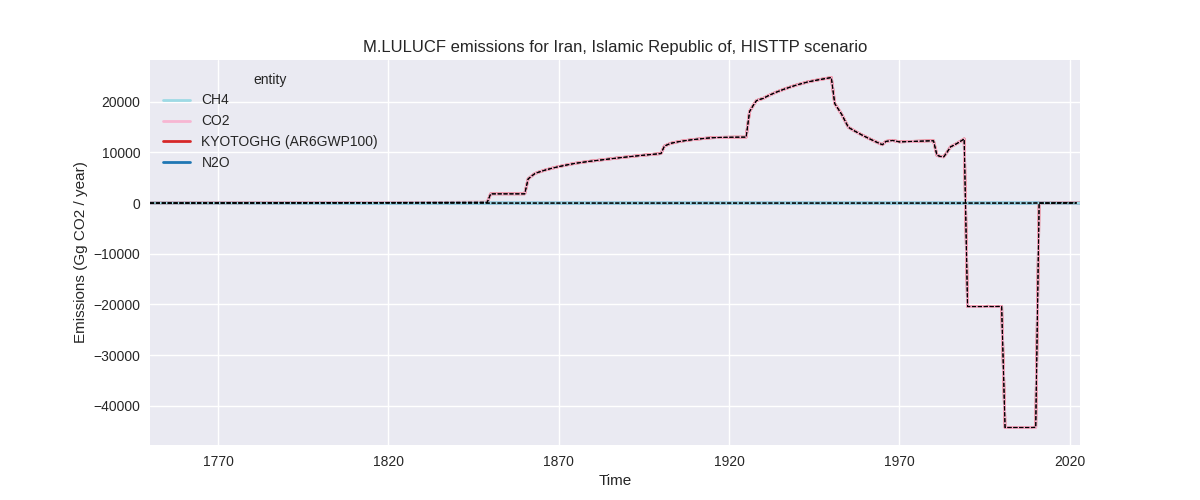
Overview over changes
In the country reported priority scenario we have the following changes for aggregate Kyoto GHG and national total emissions excluding LULUCF (M.0.EL):
- Emissions in 2022 have changed by 1.2%% (12198.90 Gg CO2 / year)
- Emissions in 1990-2022 have changed by 0.1%% (797.41 Gg CO2 / year)
In the third party priority scenario we have the following changes for aggregate Kyoto GHG and national total emissions excluding LULUCF (M.0.EL):
- Emissions in 2022 have changed by 2.1%% (20363.90 Gg CO2 / year)
- Emissions in 1990-2022 have changed by 0.9%% (6016.64 Gg CO2 / year)
Most important changes per scenario and time frame
In the country reported priority scenario the following sector-gas combinations have the highest absolute impact on national total KyotoGHG (AR6GWP100) emissions in 2022 (top 5):
- 1: 1.A, CO2 with 9855.04 Gg CO2 / year (1.4%)
- 2: 2, CO2 with 5118.42 Gg CO2 / year (7.3%)
- 3: 4, CH4 with -1586.73 Gg CO2 / year (-3.6%)
- 4: 5, N2O with -1477.69 Gg CO2 / year (-40.6%)
- 5: 2, HFCS (AR6GWP100) with 226.90 Gg CO2 / year (1.5%)
In the country reported priority scenario the following sector-gas combinations have the highest absolute impact on national total KyotoGHG (AR6GWP100) emissions in 1990-2022 (top 5):
- 1: 2, CO2 with 1383.82 Gg CO2 / year (3.2%)
- 2: 5, N2O with -643.44 Gg CO2 / year (-27.4%)
- 3: 4, CH4 with -135.44 Gg CO2 / year (-0.5%)
- 4: 1.A, CO2 with 76.98 Gg CO2 / year (0.0%)
- 5: 4, N2O with 34.38 Gg CO2 / year (1.1%)
In the third party priority scenario the following sector-gas combinations have the highest absolute impact on national total KyotoGHG (AR6GWP100) emissions in 2022 (top 5):
- 1: 2, CO2 with 13050.00 Gg CO2 / year (26.7%)
- 2: 1.A, CO2 with 9255.07 Gg CO2 / year (1.4%)
- 3: 5, N2O with -1477.69 Gg CO2 / year (-40.6%)
- 4: 4, CH4 with -808.34 Gg CO2 / year (-3.6%)
- 5: 2, HFCS (AR6GWP100) with 226.90 Gg CO2 / year (1.5%)
In the third party priority scenario the following sector-gas combinations have the highest absolute impact on national total KyotoGHG (AR6GWP100) emissions in 1990-2022 (top 5):
- 1: 2, CO2 with 6540.18 Gg CO2 / year (23.5%)
- 2: 5, N2O with -643.44 Gg CO2 / year (-27.4%)
- 3: 4, CH4 with -72.56 Gg CO2 / year (-0.4%)
- 4: 1.A, CO2 with 72.30 Gg CO2 / year (0.0%)
- 5: 4, N2O with 7.65 Gg CO2 / year (0.7%)
Notes on data changes
Here we list notes explaining important emissions changes for the country. ’' means that the following text only applies to the TP time series, while means that it only applies to the CR scenario. Otherwise the note applies to both scenarios.
- We have no new country reported data for Iran.
- The main changes in the CR time-series come from updated third part data for energy and cement CO2. The cement CO2 time series is much higher for all years.
- Changes in the TP time-series for the same sectors and gases are more pronounced.
- Changes in sectors 4 and 5 are due to the removal of FAOSTAT data (CR, TP).
Changes by sector and gas
For each scenario and time frame the changes are displayed for all individual sectors and all individual gases. In the sector plot we use aggregate Kyoto GHGs in AR6GWP100. In the gas plot we usenational total emissions without LULUCF. ## country reported scenario
2022
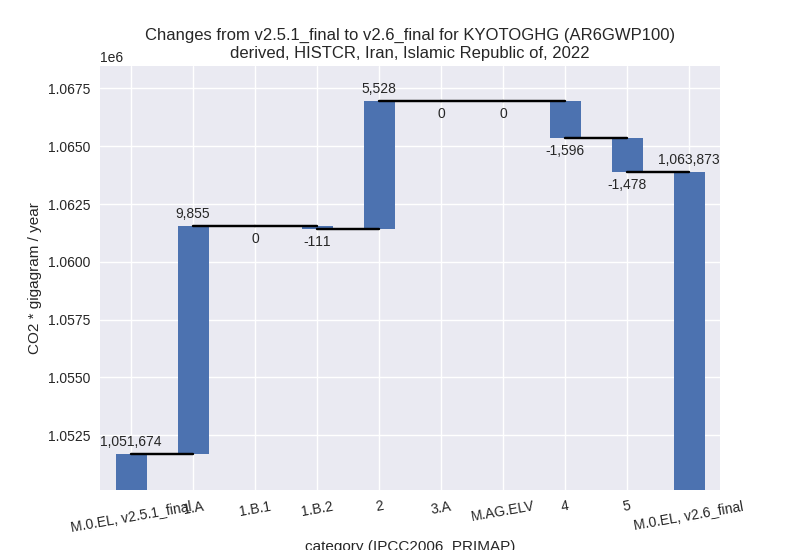
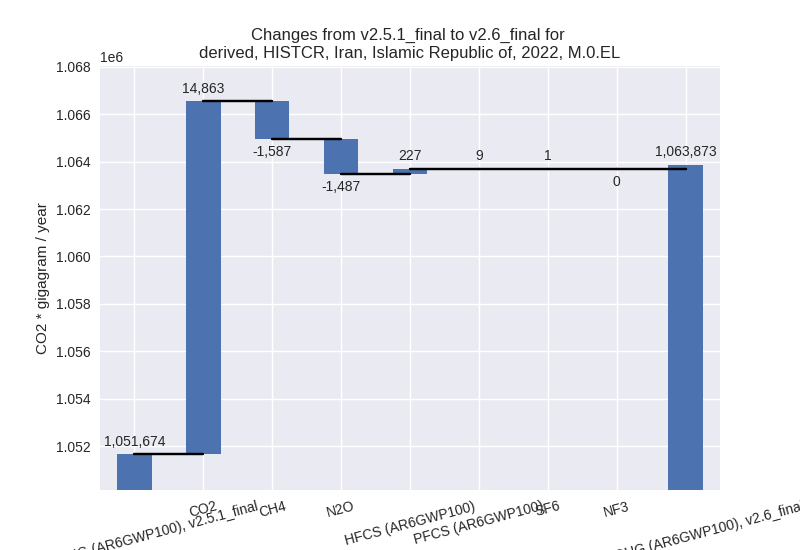
1990-2022
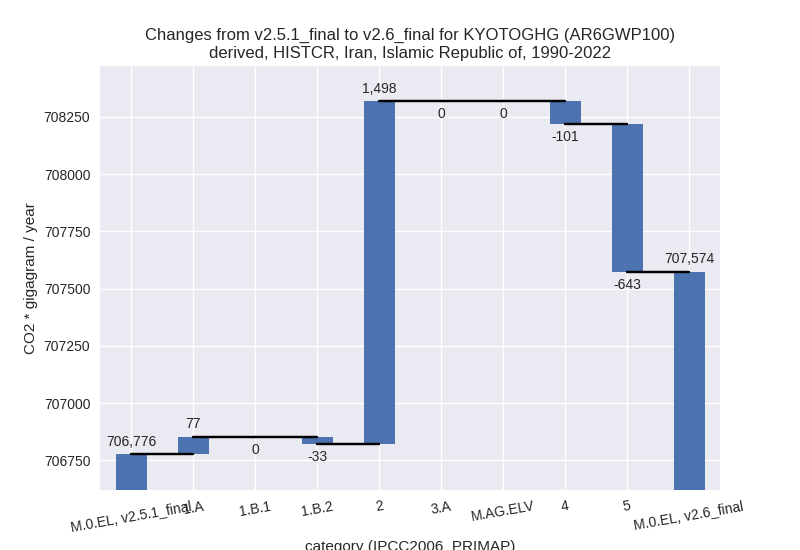
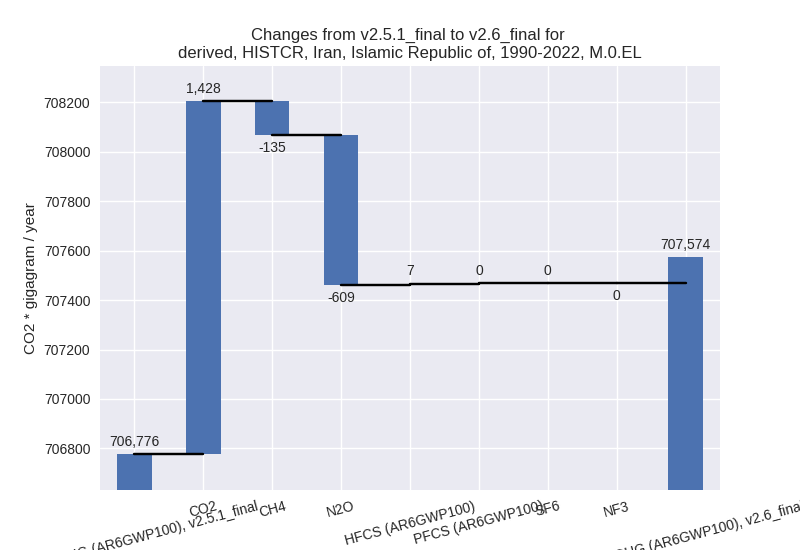
third party scenario
2022
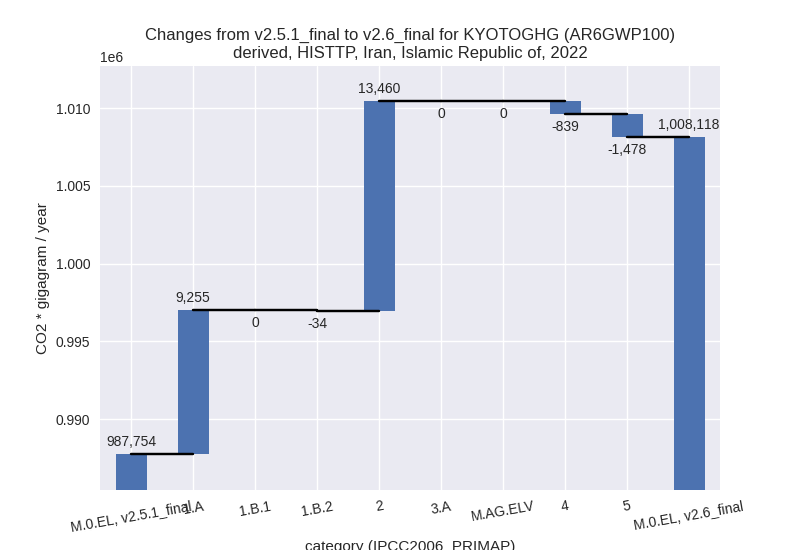
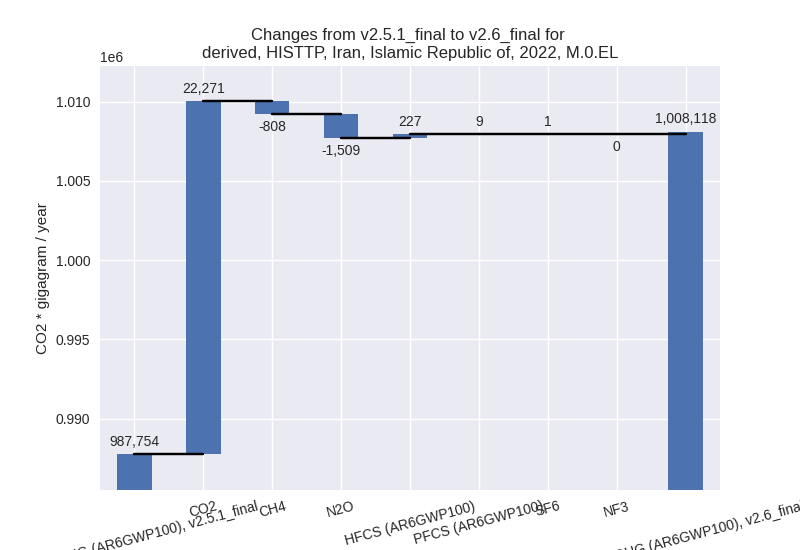
1990-2022
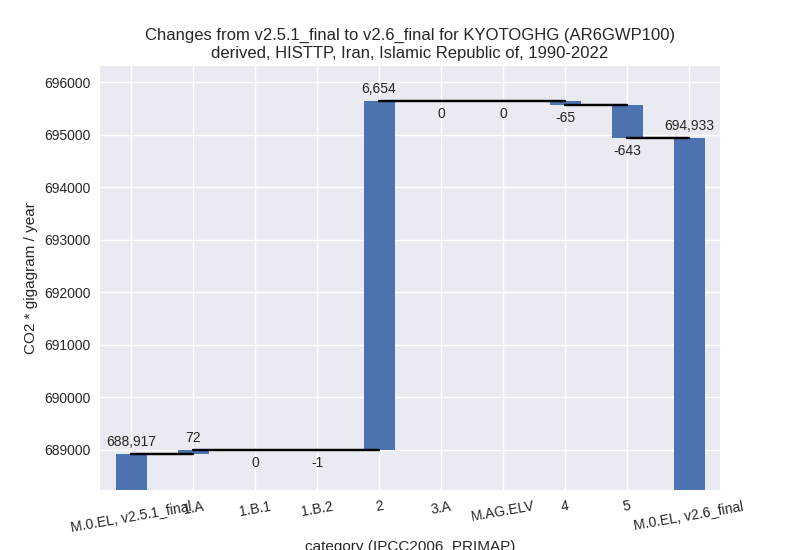
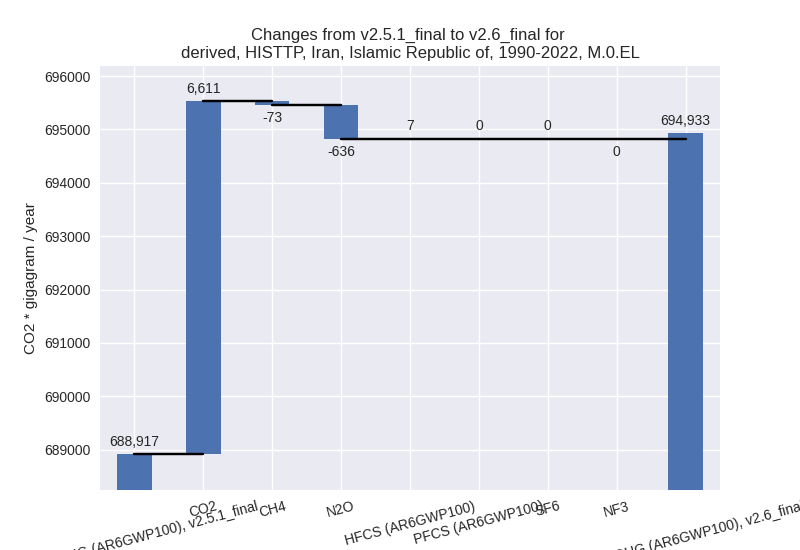
Detailed changes for the scenarios:
country reported scenario (HISTCR):
Most important changes per time frame
For 2022 the following sector-gas combinations have the highest absolute impact on national total KyotoGHG (AR6GWP100) emissions in 2022 (top 5):
- 1: 1.A, CO2 with 9855.04 Gg CO2 / year (1.4%)
- 2: 2, CO2 with 5118.42 Gg CO2 / year (7.3%)
- 3: 4, CH4 with -1586.73 Gg CO2 / year (-3.6%)
- 4: 5, N2O with -1477.69 Gg CO2 / year (-40.6%)
- 5: 2, HFCS (AR6GWP100) with 226.90 Gg CO2 / year (1.5%)
For 1990-2022 the following sector-gas combinations have the highest absolute impact on national total KyotoGHG (AR6GWP100) emissions in 1990-2022 (top 5):
- 1: 2, CO2 with 1383.82 Gg CO2 / year (3.2%)
- 2: 5, N2O with -643.44 Gg CO2 / year (-27.4%)
- 3: 4, CH4 with -135.44 Gg CO2 / year (-0.5%)
- 4: 1.A, CO2 with 76.98 Gg CO2 / year (0.0%)
- 5: 4, N2O with 34.38 Gg CO2 / year (1.1%)
Changes in the main sectors for aggregate KyotoGHG (AR6GWP100) are
- 1: Total sectoral emissions in 2022 are 872498.46 Gg CO2 / year which is 82.0% of M.0.EL emissions. 2022 Emissions have changed by 1.1% (9744.28 Gg CO2 / year). 1990-2022 Emissions have changed by 0.0% (44.37 Gg CO2 / year).
- 2: Total sectoral emissions in 2022 are 100392.26
Gg CO2 / year which is 9.4% of M.0.EL emissions. 2022 Emissions have
changed by 5.8% (5528.19 Gg CO2 /
year). 1990-2022 Emissions have changed by 2.6% (1497.54 Gg CO2 / year). For 2022 the
changes per gas
are:
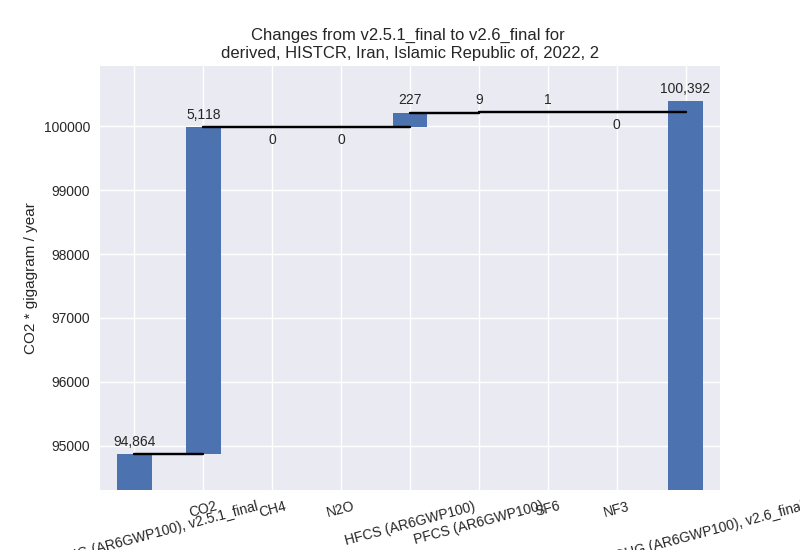
For 1990-2022 the changes per gas are: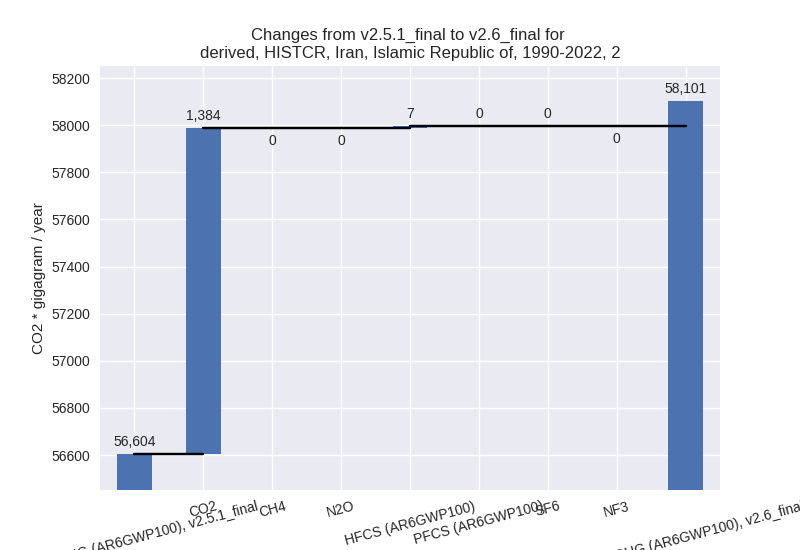
- M.AG: Total sectoral emissions in 2022 are 45354.22 Gg CO2 / year which is 4.3% of M.0.EL emissions. 2022 Emissions have changed by 0.0% (0.00 Gg CO2 / year). 1990-2022 Emissions have changed by 0.0% (0.00 Gg CO2 / year).
- 4: Total sectoral emissions in 2022 are 43461.23 Gg
CO2 / year which is 4.1% of M.0.EL emissions. 2022 Emissions have
changed by -3.5% (-1595.90 Gg CO2 /
year). 1990-2022 Emissions have changed by -0.3% (-101.06 Gg CO2 / year). For 2022
the changes per gas
are:
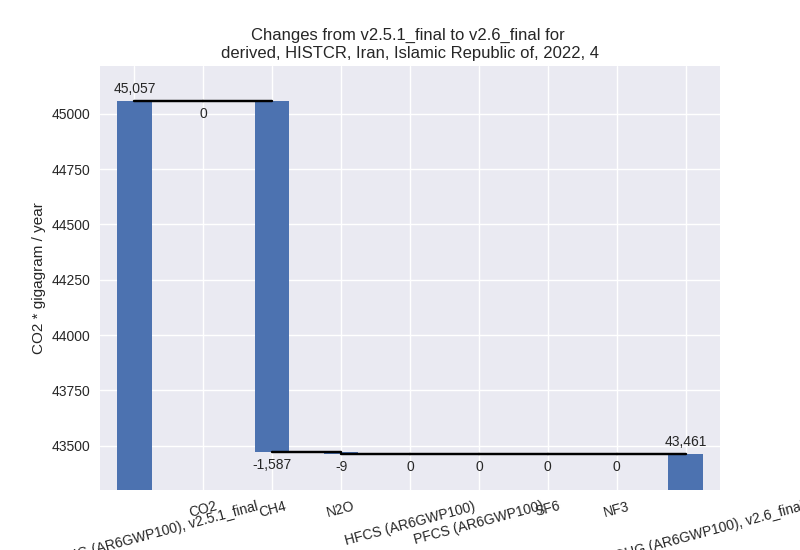
- 5: Total sectoral emissions in 2022 are 2166.43 Gg
CO2 / year which is 0.2% of M.0.EL emissions. 2022 Emissions have
changed by -40.6% (-1477.69 Gg CO2 /
year). 1990-2022 Emissions have changed by -27.4% (-643.44 Gg CO2 / year). For 2022
the changes per gas
are:
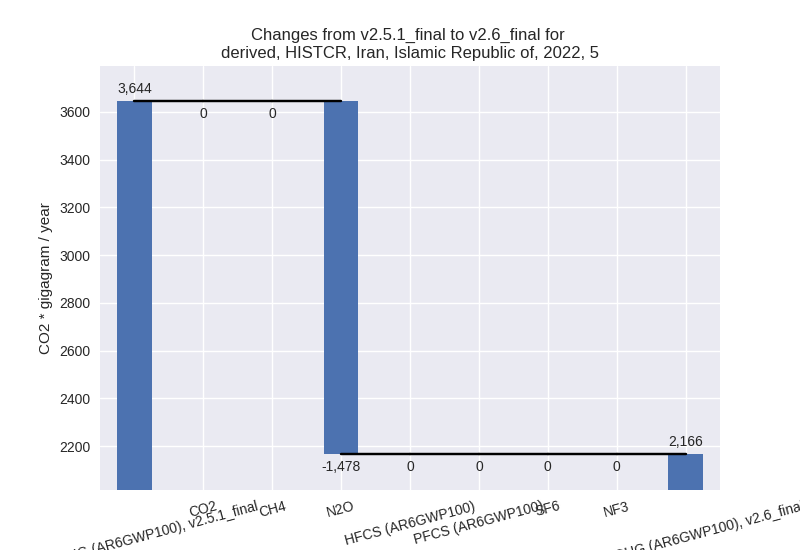
For 1990-2022 the changes per gas are: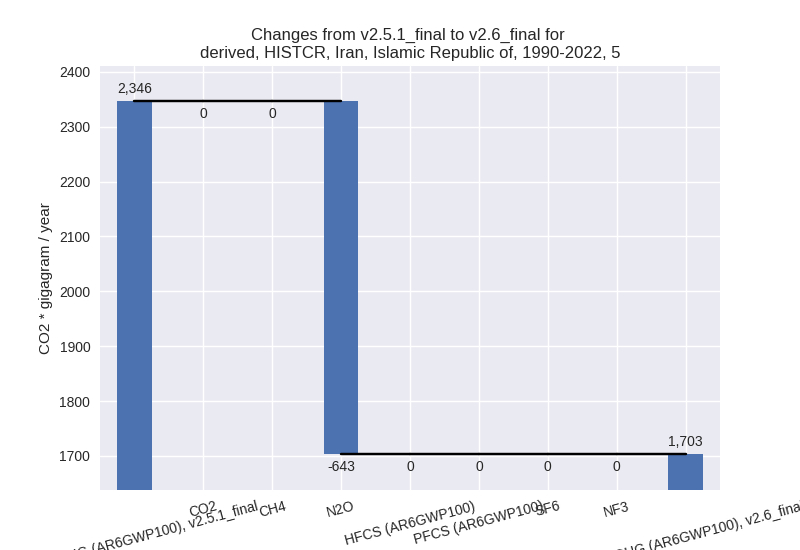
third party scenario (HISTTP):
Most important changes per time frame
For 2022 the following sector-gas combinations have the highest absolute impact on national total KyotoGHG (AR6GWP100) emissions in 2022 (top 5):
- 1: 2, CO2 with 13050.00 Gg CO2 / year (26.7%)
- 2: 1.A, CO2 with 9255.07 Gg CO2 / year (1.4%)
- 3: 5, N2O with -1477.69 Gg CO2 / year (-40.6%)
- 4: 4, CH4 with -808.34 Gg CO2 / year (-3.6%)
- 5: 2, HFCS (AR6GWP100) with 226.90 Gg CO2 / year (1.5%)
For 1990-2022 the following sector-gas combinations have the highest absolute impact on national total KyotoGHG (AR6GWP100) emissions in 1990-2022 (top 5):
- 1: 2, CO2 with 6540.18 Gg CO2 / year (23.5%)
- 2: 5, N2O with -643.44 Gg CO2 / year (-27.4%)
- 3: 4, CH4 with -72.56 Gg CO2 / year (-0.4%)
- 4: 1.A, CO2 with 72.30 Gg CO2 / year (0.0%)
- 5: 4, N2O with 7.65 Gg CO2 / year (0.7%)
Changes in the main sectors for aggregate KyotoGHG (AR6GWP100) are
- 1: Total sectoral emissions in 2022 are 857229.49 Gg CO2 / year which is 85.0% of M.0.EL emissions. 2022 Emissions have changed by 1.1% (9221.07 Gg CO2 / year). 1990-2022 Emissions have changed by 0.0% (71.09 Gg CO2 / year).
- 2: Total sectoral emissions in 2022 are 87112.02 Gg
CO2 / year which is 8.6% of M.0.EL emissions. 2022 Emissions have
changed by 18.3% (13459.77 Gg CO2 /
year). 1990-2022 Emissions have changed by 16.3% (6653.90 Gg CO2 / year). For 2022
the changes per gas
are:
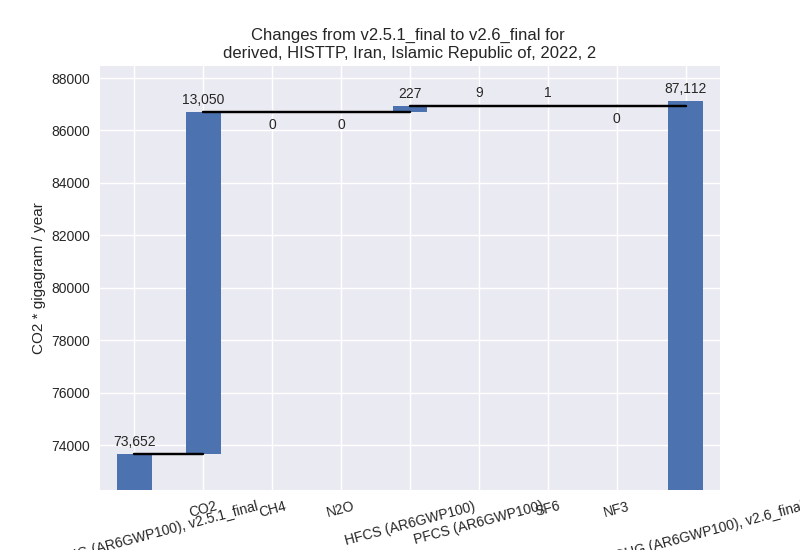
For 1990-2022 the changes per gas are: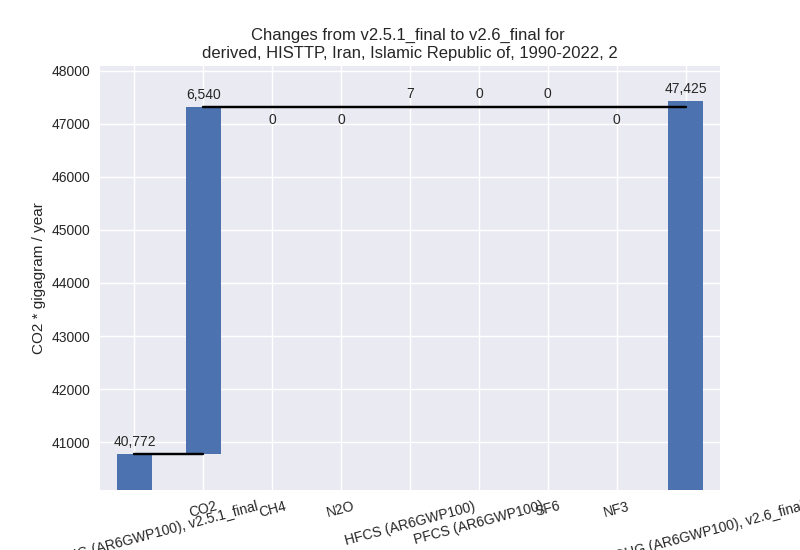
- M.AG: Total sectoral emissions in 2022 are 38747.85 Gg CO2 / year which is 3.8% of M.0.EL emissions. 2022 Emissions have changed by 0.0% (0.00 Gg CO2 / year). 1990-2022 Emissions have changed by 0.0% (0.00 Gg CO2 / year).
- 4: Total sectoral emissions in 2022 are 22861.76 Gg
CO2 / year which is 2.3% of M.0.EL emissions. 2022 Emissions have
changed by -3.5% (-839.29 Gg CO2 /
year). 1990-2022 Emissions have changed by -0.4% (-64.90 Gg CO2 / year). For 2022 the
changes per gas
are:
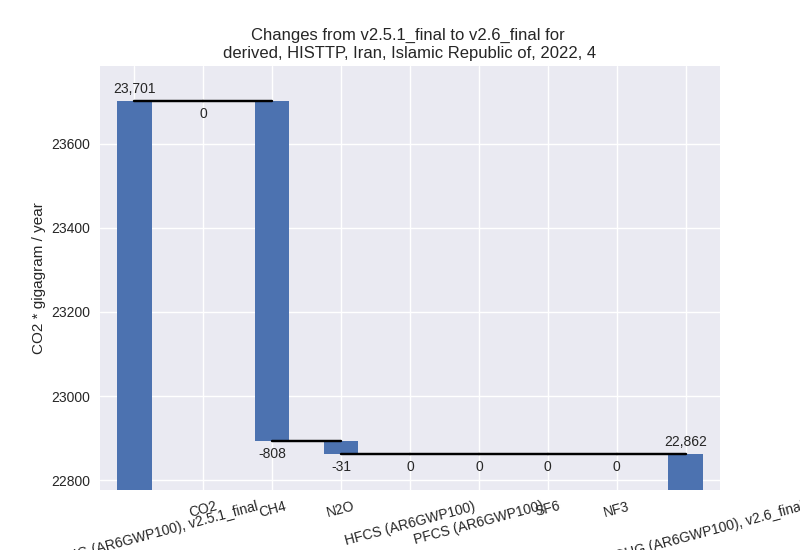
- 5: Total sectoral emissions in 2022 are 2166.43 Gg
CO2 / year which is 0.2% of M.0.EL emissions. 2022 Emissions have
changed by -40.6% (-1477.69 Gg CO2 /
year). 1990-2022 Emissions have changed by -27.4% (-643.44 Gg CO2 / year). For 2022
the changes per gas
are:
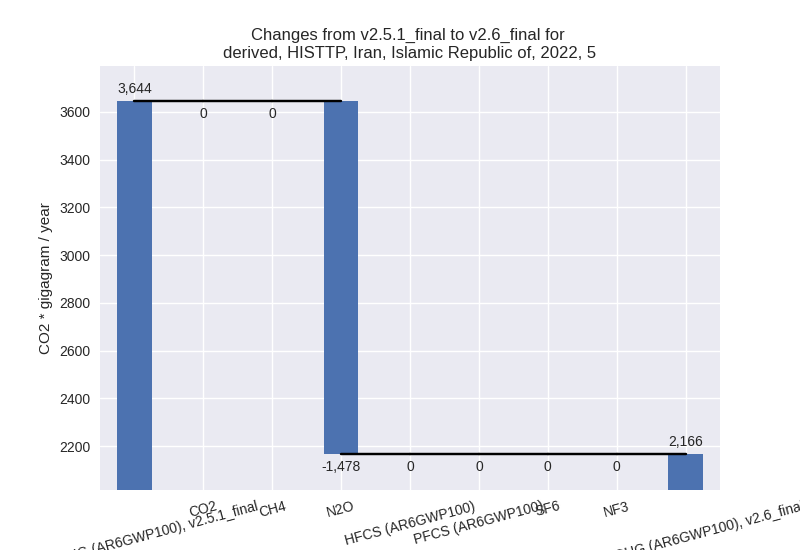
For 1990-2022 the changes per gas are: